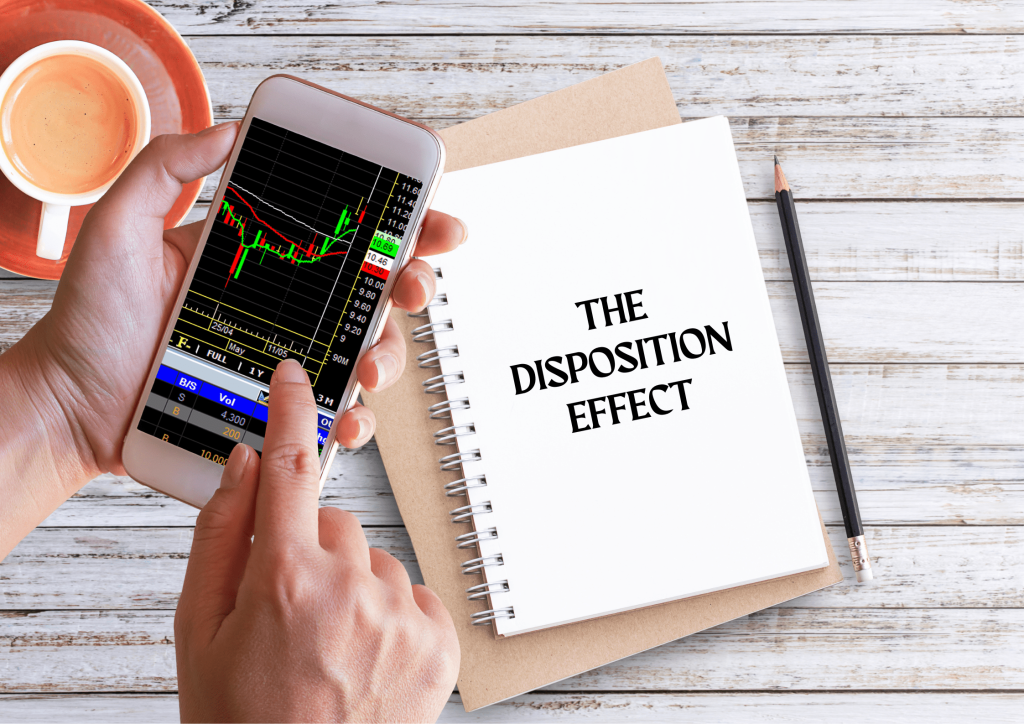In the realm of financial markets, the “disposition effect” is a common behavioral bias that impacts individual investors' decisions. The disposition effect refers to the tendency for investors to sell their winning positions while holding onto losing ones, a pattern that conflicts with the efficient capital market theory and has the potential to significantly reduce trading performance.
What is the Disposition Effect and How Does it Exist?

The term “disposition effect” exists in the sphere of psychological and behavioral science. It describes an investor's propensity to prematurely sell assets that have made financial gains (winning positions) and to hold on to assets that have made losses (losing positions). The manifestation of the disposition effect in financial markets and its implications have been scrutinized in studies involving human participants, revealing the prevalence of this behavioral bias among individual investors, mutual fund managers, and even hedge funds.
Behavioral biases affect prices and market trends, a phenomenon confirmed by a stock trading experiment conducted. The findings showed a significant average disposition effect displayed by participants, regardless of their commercial or financial relationships. This observation underscores that the disposition effect varies, and it is not solely a characteristic of novice or retail traders.
The Psychological Underpinnings of the Disposition Effect
Prospect theory, developed by psychologists Daniel Kahneman and Amos Tversky, explains why the disposition effect exists to approximately the same extent among different investor classes. According to this theory, investors evaluate financial gains and losses relative to a fixed reference point (often the stock purchase price), resulting in a behavior termed “loss aversion.”
Loss aversion, coupled with mental accounting, drives investors to sell winners and ride losers. These tendencies can lead to a significant reverse disposition effect during an overall downward market trend. The desire to avoid the pain associated with realizing a loss often outweighs rational investment strategies.
Also Read: Mastering Forex Trading Psychology
The Disposition Effect in Practice
Trading records examined in a control and treatment phase of a between-subjects lab experiment demonstrated both the average disposition effect and the significant reverse disposition effect. During the control phase, investors showed a propensity to sell assets that were performing well (winning positions), leading to an aggregate portfolio profit lower than the potential maximum.
However, in the treatment phase where an alternative calculation procedure was introduced to estimate the standardized mean difference of potential outcomes, there was a conscious or unconscious switching in behavior. This resulted in a lower disposition effect and a corresponding increase in aggregate portfolio profit.
Moreover, in the context of a mean reverting setting – where prices that have risen or fallen sharply are likely to reverse – the disposition effect observed can further impair investment performance. Investors selling winners and holding losers in a mean-reverting market can result in significant personal network losses.
Mitigating the Disposition Effect

Mitigating the disposition effect is integral to performance reducing investment flaws and achieving profit maximization goals suggesting. Various methods can be employed, ranging from improved awareness of behavioral biases to enhanced investor education and the use of robo-advisors.
Awareness of how behavioral biases affect prices and market trends can significantly help individual investors. Acknowledging that the disposition effect exists and understanding its implications is the first step toward making informed trading decisions. This knowledge can assist in the development of a trading strategy that counteracts the disposition effect, leading to improved individual trading performance relative to the market.
The control and treatment phases of the experiment highlight the potential of cognitive tools in mitigating the disposition effect. By using an alternative calculation procedure that focuses on the estimated standardized mean difference of potential outcomes, investors can overcome their biases and avoid the pitfalls of the disposition effect.
Moreover, financial technology, such as robo-advisors and AI trading platforms, can also aid in overcoming the disposition effect. By removing human emotions from trading decisions, these tools can help maintain a focus on the data and avoid biases.
The Disposition Effect and the Forex Market
In the realm of Forex trading, the disposition effect proves detrimental. Similar to stock markets, currencies exhibit mean reversion, making the behavior of holding losing positions and selling winning ones a performance-reducing flaw. As such, Forex traders need to take extra care to avoid falling victim to the disposition effect.
Forex Trading and the Risk of Disposition Effect

The risk of the disposition effect in Forex trading extends to all types of traders. Whether they're independent day traders, commercial entities involved in international trade, hedge fund managers, or even mutual fund managers, the propensity to hold onto losing assets and sell winning positions is an obstacle to achieving optimal trading performance. The disposition effect frequently found in these trading categories poses a significant threat to aggregate portfolio profits.
The Influence of the Disposition Effect on Forex Trading
The disposition effect exists in Forex trading, often leading to a significant average disposition effect. Forex traders, much like stock traders, are susceptible to holding onto losing positions in hopes of a market turnaround and prematurely selling their winning positions to secure an immediate profit.
This behavior can significantly affect Forex traders because the currency market trends can be influenced by numerous external factors, such as geopolitical events, economic indicators, and central bank decisions. If traders hold onto losing positions during a downward market trend, they can experience considerable financial losses. Conversely, selling winning positions prematurely during an upward market trend can result in missed opportunities for larger financial gains.
Also Read: What is Position Trading
The Impact of Mean Reversion on Forex Trading

Forex markets can mean reverting, similar to stock markets. In a mean-reverting setting, currency pairs that have risen or fallen sharply are likely to revert to their mean or average price over time. This tendency is significant because if Forex traders prematurely sell their winning positions (currencies that have appreciated) and hold onto their losing ones (currencies that have depreciated), they can experience reduced trading performance. This pattern aligns with the disposition effect, indicating that the disposition effect can have an even more substantial impact in a mean-reverting Forex market.
Mitigating the Disposition Effect in Forex Trading
Given the potential for the disposition effect to undermine Forex trading performance, it is crucial to develop strategies to mitigate this behavioral bias. Increased awareness and understanding of the disposition effect can help traders make more informed decisions and resist the temptation to sell winners and ride losers.
Moreover, utilizing a systematic trading strategy can also help mitigate the effects of this bias. This approach can involve setting predetermined points at which to sell or buy currency pairs, thus reducing the influence of emotional decision-making.
Automated trading systems or robo-advisors, which make trading decisions based on pre-set algorithms, can also be useful. These systems are not affected by emotional biases and will stick to the trading strategy regardless of short-term market fluctuations, thereby helping to avoid the disposition effect.
Additionally, using stop loss and take profit orders can limit losses and secure profits, reducing the likelihood of holding onto losing positions or selling winning ones prematurely.
The Role of Personal Networks and Information Sharing

The role of significant personal networks can also contribute to the disposition effect in Forex trading. Traders often rely on information shared within their networks when making trading decisions. This can create a collective bias if a significant portion of the network is affected by the disposition effect, causing them to hold onto losing positions and sell winning ones.
The need for caution becomes even more critical when these networks involve market makers, whose actions can significantly influence the traded price of currency pairs. It's important to be aware that the disposition effect can permeate these networks and affect trading decisions on a broader scale.
Conclusion
While the disposition effect can be detrimental to Forex's trading performance, it is not insurmountable. Traders who are aware of this bias and take steps to mitigate its impact can significantly improve their trading performance relative to the market.
By understanding that currencies are mean-reverting securities and that behavioral biases can influence trading decisions, traders can develop more effective strategies. Ultimately, overcoming the disposition effect in Forex trading is about acknowledging and counteracting our natural psychological biases to make more rational and profitable trading decisions.
It's also worth noting that in the face of all these complexities, the Forex market still operates on the efficient capital market theory. It postulates that at any given time, prices fully reflect all available information, hence removing the capacity for consistently achieving above-average returns. Therefore, to be successful, traders must take into account the market's efficiency, their behavioral biases, and the impact of external factors on currency prices.
Also Read: What is Risk Appetite in Forex Trading?
FAQs
How does the disposition effect impact a Forex trader's decision-making process?
The disposition effect can significantly influence a Forex trader's decision-making process. It often leads traders to hold onto losing positions in the hope that the currency will rebound, and they can avoid realizing a loss. This is also known as ‘riding losers.' On the other hand, traders may prematurely sell their winning positions to secure an immediate profit, a behavior often referred to as ‘selling winners.' This pattern of behavior can lead to missed opportunities for larger financial gains and unnecessary financial losses.
What strategies can Forex traders implement to mitigate the impact of the disposition effect?
Forex traders can use several strategies to mitigate the impact of the disposition effect. Firstly, creating a systematic trading strategy with predetermined rules for entering and exiting trades can reduce emotional decision-making. Automated trading systems or robo-advisors can also be useful in this regard as they make decisions based on pre-set algorithms, unaffected by emotional biases.
Using stop loss and take profit orders can be another helpful strategy. These orders automatically close a trade when it reaches a certain loss or profit level, respectively, helping to limit losses and secure profits. Diversification across different currency pairs can also help spread risk and reduce the impact of the disposition effect.
Education is another crucial strategy. Understanding the disposition effect, why it happens, and how it can impact trading performance can help traders recognize and counteract this behavioral bias in their trading decisions.
Does the disposition effect only impact individual investors or also large institutional traders like hedge funds and mutual fund managers?
The disposition effect impacts all types of traders, from individual retail traders to large institutional traders like hedge fund managers and mutual fund managers. Regardless of their size or the markets in which they operate, all traders can fall victim to the same psychological biases that lead to the disposition effect. That said, institutional traders often have more resources, such as dedicated risk management teams and advanced trading systems, to help identify and mitigate the effects of behavioral biases like the disposition effect.













